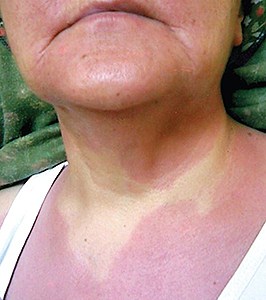
Niacin is a water-soluble member of the B-vitamins. Our bodies can create niacin; however, there will be times when you need to supplement it.
Niacin doesn’t have a direct effect on height. However, it can combat obesity, which is a significant factor affecting the release of growth hormone. In a study with children with obesity, niacin intake lowered the level of free fatty acids, which encouraged the delivery of growth hormones (Galescu et al., 2018).
Niacin also helps treat certain diseases such as managing cholesterol levels, reducing the risk of a heart attack, and controlling diabetes and arthritis. Not all people will require a prescription for niacin since it’s easily available over the counter and in food.
How Does Niacin Affect Height?
Administering niacin for height improvement is an intriguing prospect. Although there are only a few studies about niacin and height, they do seem promising.
People who are obese have a high concentration of free fatty acids (FFA), which hinders the release of growth hormones in the body. Niacin helps by preventing the breakdown of fats via hydrolysis to release more fatty acids. In return, this lowers the level of circulating free fatty acids.
It’s noteworthy to know that niacin is a potent releaser of growth hormone. In a study with eight healthy male volunteers, niacin was intravenously given in a 500 mg dosage. The result showed that there was a surge in growth hormone release in the body. While in the second stage of the study, they regulate the infusion of fatty acids, and the outcome is that it stops the increase of growth hormones (Quabbe et al. 1983).
The results of this study show that niacin helps in producing more growth hormone if there is less fat in our bodies. Growth hormone is responsible for increasing height levels of individuals.
The RDA (Recommended Dietary Allowance) for niacin is around 15 mg. per day. There is no evidence, however, that going beyond the RDA for niacin will cause any additional growth.

Niacin Sources
Although niacin intake via supplements is relatively safe, you should consult your doctor if you have plans to increase the dosage. There are also natural sources of niacin available; most of them are either plant-based or animal-based, and they are easily accessible.
Tuna
Tuna is a good alternative for people who don’t eat meat. Aside from being a great source of protein, it also has the right concentration of omega-3 fatty acids, selenium, and vitamins B6 and B12. One hundred sixty-five grams of canned tuna has 21.9 mg of niacin. This serving provides over 100% of the RDA for niacin for both men and women.
If you have concerns about mercury levels because it’s tuna, keep in mind that your body can easily filter the mercury from one can of tuna per week. Canned light tuna has the least amount of mercury.
Chicken Breast
Chicken breast is a good source of niacin, and it has exceptional lean protein quantity. Eighty-five grams of cooked chicken breast amounts to 11.4 mg of niacin.
Eighty-five grams of chicken breast supplies 71%-81% RDA of niacin for men and women. If you are a chicken thigh person, keep in mind the niacin level gets cut in half in the thighs.
Pork
Go for lean kinds of pork such as tenderloins and thin pork chops. A serving with 85 grams of roasted lean pork offers 6.3 mg of niacin and delivers 39%-45% RDA of niacin to men and women.
Pork is also a good source of thiamine or vitamin B1, which helps with metabolism.
Ground Beef
The lean variety of ground beef also gives a higher level of niacin. A pound of 95% lean ground beef has around 33 mg. of niacin. Moreover, grass-fed beef produces more omega-3 fatty acids and antioxidants in comparison to grain-fed meat.
Potatoes
Potatoes are a good source of niacin with or without the skin. A large potato has 4.2 mg of niacin. This serving size is about 30% of the RDA for women and 25% for men. You can also consume sweet potatoes as it has the same amount of niacin as normal potatoes.
Avocado
A medium-sized avocado has 3.5 mg of niacin and is equivalent to 21% of the RDA for men and 25% for women. Avocado is also a rich source of monounsaturated fats that help lower your risk of a heart attack, as well as a source of fiber and different vitamins and minerals.
Peanuts
Peanuts are an excellent vegetarian choice for those who want to increase niacin intake. With two tablespoons of peanut butter, you get 4.3 mg of niacin, which is 30% of the RDA for women and 25% for men.
Peanuts are excellent sources of vitamins E, B6, monounsaturated fats, magnesium, and phosphorus.
Green Peas
Another great vegetarian source of niacin is green peas. A cup (165 grams) of green peas has 3 mg of niacin and equates to 20% of the RDA levels for men and women. Aside from this, green peas also have high levels of antioxidants that help in reducing the risk of cancer.
Peanuts also help in stimulating the production of gut bacteria and keep cholesterol levels low.
Health Risks of Too Much Niacin

While you can’t have too much niacin when you eat niacin-rich food, the overdose happens when you abuse over-the-counter forms of niacin. The main side effect of taking too much niacin is flushing.
Flushing occurs when an individual feels a burning and tingling sensation for 15-30 minutes. Notably, about 70% of people who consume niacin undergo flushing with occasional skin rashes and itching.
A pre-treatment of aspirin will reduce flushing; however, this will also be dependent on the amount of niacin. It’s best to talk to your doctor before taking aspirin, since it may create an allergic reaction.
Other symptoms of niacin overdose include the following:
- Diarrhea
- Pain in the Abdomen
- Fast heartbeat
- Gout
- Nausea and Vomiting
Niacin Intake FAQ
Does niacin help you sleep well?
People with depression and insomnia are often prescribed niacin or vitamin B3. Niacin helps by speeding up the reaction time of tryptophan, the chemical responsible for having a goodnight’s sleep.
Who can’t take niacin?
People with liver problems, stomach ulcers, and bleeding shouldn’t take niacin. Niacin may increase liver and stomach damage. If you need to take niacin, consult your doctor, it’s more likely that he will give you small doses or pair it with another medication.
Pregnant or breastfeeding mothers are most likely safe to take niacin. However, the dosage should be less than 30 mg a day.
Is niacin safe to pair with other medications?
Depending on the medicine, niacin might have minor or moderate interactions with them. Niacin is known to have a slight reaction with aspirin, but it has a different response when taking medications for diabetes, blood clots, and high blood pressure. While niacin is most likely safe in normal amounts, it’s always best to get a proper consultation with your doctor.

